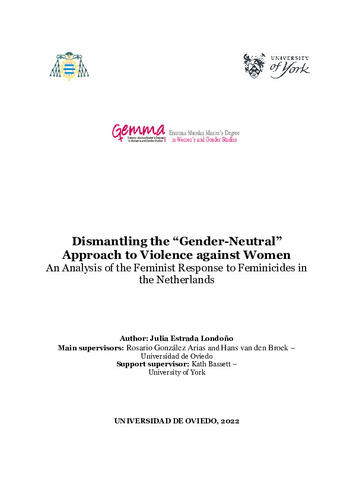Dismantling the “gender-neutral” approach to violence against women: an analysis of the feminist response to feminicides in the Netherlands
Otros títulos:
Desmontando el enfoque "género neutro" de la violencia contra las mujeres: un análisis de la respuesta feminista a los feminicidios en los Países Bajos
Autor(es) y otros:
Director(es):
Fecha de publicación:
Serie:
Máster Universitario Erasmus Mundus en Estudios de las Mujeres y de Género
Descripción física:
Resumen:
Various feminist movements such as #NiUnaMas and #MeToo have addressed the prevalence of gender-based violence within heteropatriarchal societies and its severest form, feminicides. While many national and international governments have aimed to implement specific policies to combat this form of violence, in the Netherlands, these issues have not received adequate attention within the public debate. The lack of legal framework and the “gender-neutral” approach constitute obstacles to the proper prosecution and documentation of feminicides. Nonetheless, women’s organizations have started to petition the incorporation of this extreme type of gender-based violence in the national criminal code. Therefore, this thesis aims to examine how the Dutch feminist movement has addressed and positioned the issue of gender-based violence, particularly feminicides, in the Netherlands. It will analyze and compare the feminist activism against gender-based violence of the second half of the 20th century and the 21st century and assess its effects on society and politics. It will conduct an extensive literature review on gender-based violence, femicides, feminicides, and feminist activism against gender-based violence, establishing the theoretical framework for this research. Furthermore, this thesis will apply qualitative research methods. By conducting semi-structured interviews with members of women’s organizations from different backgrounds, such as the Nederlandse Vrouwenraad, Feminist Collages Amsterdam, and Atria, it aims to obtain in-depth knowledge on the current politicization of gender-based violence. These interviews will provide insights into the current strategies and approaches used by women’s organizations to influence the public agenda on gender-based violence and particularly feminicides. Moreover, this thesis will adopt an intersectional feminist perspective to consider the intersecting categories that are constitutive to oppression and violence against women.
Various feminist movements such as #NiUnaMas and #MeToo have addressed the prevalence of gender-based violence within heteropatriarchal societies and its severest form, feminicides. While many national and international governments have aimed to implement specific policies to combat this form of violence, in the Netherlands, these issues have not received adequate attention within the public debate. The lack of legal framework and the “gender-neutral” approach constitute obstacles to the proper prosecution and documentation of feminicides. Nonetheless, women’s organizations have started to petition the incorporation of this extreme type of gender-based violence in the national criminal code. Therefore, this thesis aims to examine how the Dutch feminist movement has addressed and positioned the issue of gender-based violence, particularly feminicides, in the Netherlands. It will analyze and compare the feminist activism against gender-based violence of the second half of the 20th century and the 21st century and assess its effects on society and politics. It will conduct an extensive literature review on gender-based violence, femicides, feminicides, and feminist activism against gender-based violence, establishing the theoretical framework for this research. Furthermore, this thesis will apply qualitative research methods. By conducting semi-structured interviews with members of women’s organizations from different backgrounds, such as the Nederlandse Vrouwenraad, Feminist Collages Amsterdam, and Atria, it aims to obtain in-depth knowledge on the current politicization of gender-based violence. These interviews will provide insights into the current strategies and approaches used by women’s organizations to influence the public agenda on gender-based violence and particularly feminicides. Moreover, this thesis will adopt an intersectional feminist perspective to consider the intersecting categories that are constitutive to oppression and violence against women.
Colecciones
- Trabajos Fin de Máster [5292]
Ficheros en el ítem





